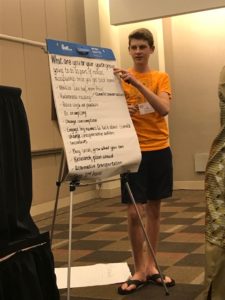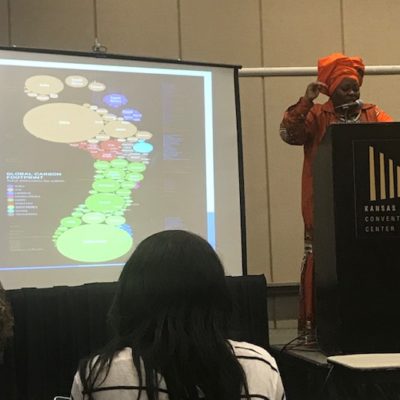By Olivia Smucker
Whether through seminars, booth presentations or making global warming bracelets, there were many unique opportunities to engage with climate action at the 2019 MCUSA convention this July.
The Center for Sustainable Climate Solutions (CSCS) and Mennonite Creation Care Network (MCCN) led the charge on the majority of the material, featuring interactive activities at their booths as well as leading equipping seminars for adults and youth.
Hearing from the Global South
Dr. Sibonokuhle Ncube, one of CSCS’s “voices of the Global South”, led two particularly powerful seminars on thinking about who/what is being affected by climate change and by whom.
The Global South refers to countries that would historically be referred to as “developing nations” or ones that are currently bearing the brunt of the effects of the shifting climate. The majority of them, like Ncube’s home country of Zimbabwe also fall geographically in the southern half of the globe.
Through a number of graphics depicting carbon emissions, Ncube painted a picture of how climate change is creating a “vicious cycle”. Some of the countries with the largest footprints are also the ones controlling power in the United Nations, trade agreements and more, with Global South countries having little sway.
In Zimbabwe, the droughts that used to come once every 10 years started coming every five, then every three and now nearly back to back. This shift has dealt a massive blow to the agriculture-centered country, with ninety percent of the working population currently forced into unemployment.
“When your mother has to camp out at a watering hole to get water, we begin to wonder why God has forsaken us,” said Ncube.
Along with these lamentations for her country, Ncube also called both of her seminar audiences to consider how they can engage in what she called “radical discipleship”, working toward flipping the tables on the power structure and carbon impact.
In the session geared toward youth, there was time for group discussion about how young people can work toward climate action. Some of the ideas shared included popularizing sustainability, reducing single use plastics, being mindful of fuel consumption and engaging in a less meat-dependent diet.
Learning to love our places
Group discussion proved to be an effective way of broaching the climate change subject for youth, as the “Learning to Love Our Places” seminar from MCCN had participants talking in groups about the places that they inhabit. A central theme of the seminar was that learning to love the world and its creatures is the first step toward solving the looming issue of climate change.
Jennifer Schrock, Olivia Smucker and Lillie Eisenbeis led the discussion, encouraging those in attendance to consider the aspects of their homes that were special to them. All three women commented on their experiences at Merry Lea Environmental Learning Center as well as their home states of Indiana, Virginia and South Dakota.
Along with her reflections on the beauties of the land around her home congregation, Berkey Avenue Mennonite Church in Goshen, Ind., Schrock also shared a prayer she prays daily and a list of suggestions to help people attend to the places where they live. Some recommendations included finding a “sit spot” to simply observe nature as well as taking time to learn about the native features and creatures that creation hosts. This handout is available upon request. Email mccn@goshen.edu.
A number of the groups reflected on natural wonders from their homes such as the open prairies of the Dakotas or species of unique animals, like the Shenandoah Salamander from Virginia. Many also found commonalities with other participants, like two young men from opposite sides of the country who discovered that neither of their hometowns had a Walmart!
Overall, the convention provided a decent number of opportunities for both introspection and discussion on the topic of creation care. Hopefully MCUSA convention 2021 in Cincinnati, Ohio will provide opportunities for even more!
